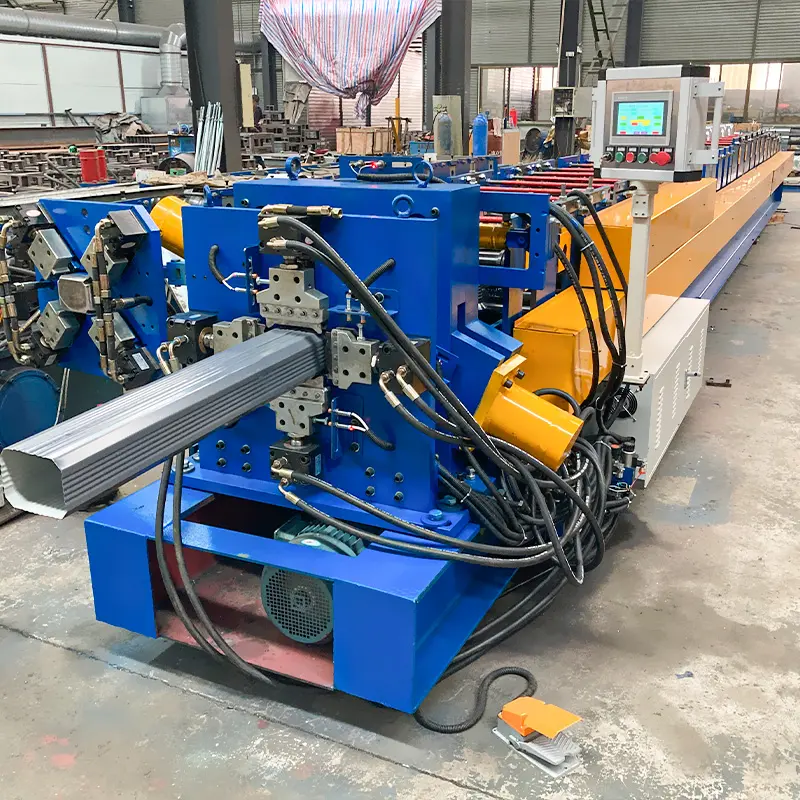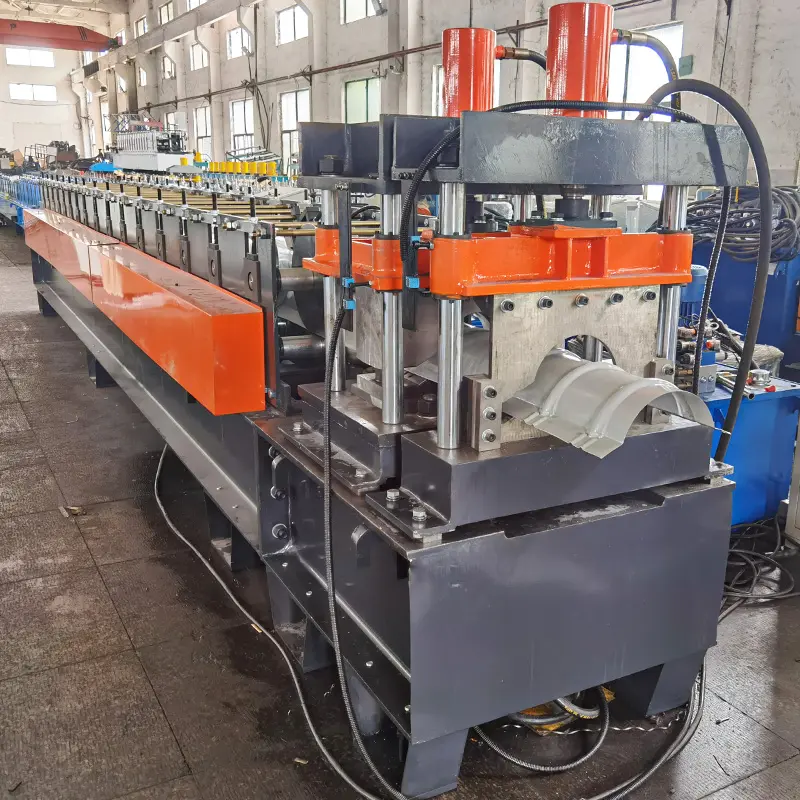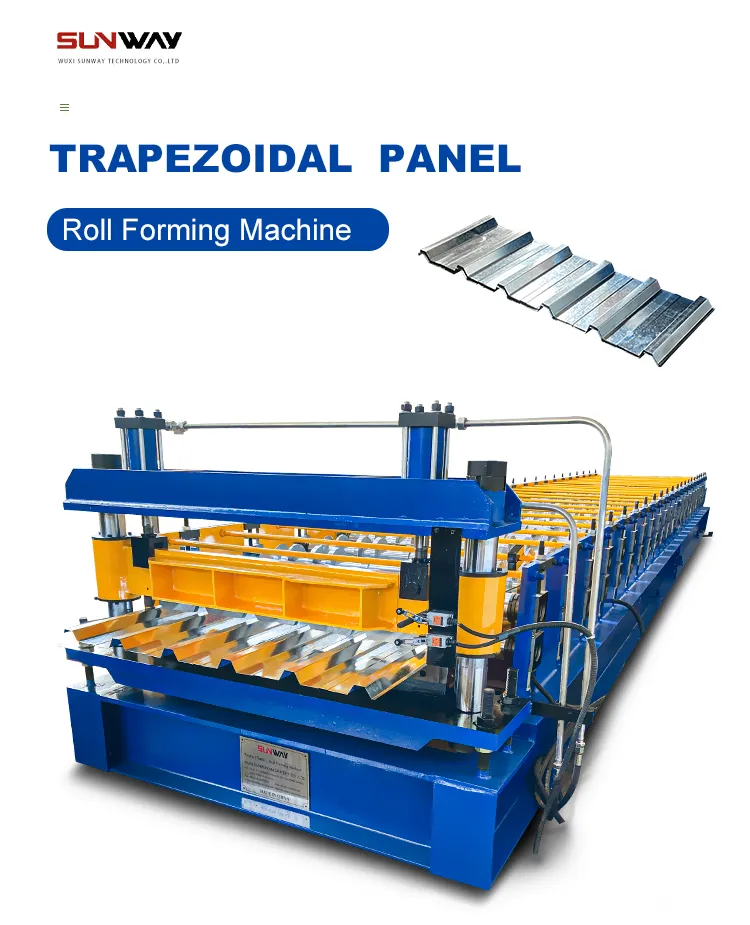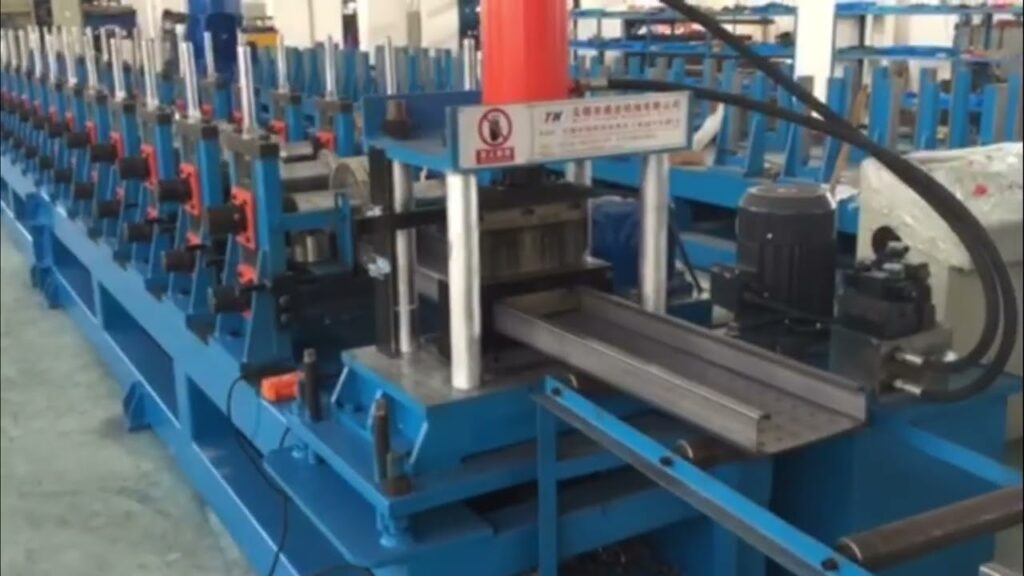परिचय
In the world of metal fabrication, efficiency and precision are key factors in achieving successful results. Portable roll forming machines have emerged as versatile tools that streamline the process of shaping metal sheets or coils into specific profiles. This article will explore the concept of portable roll forming machines, their advantages, applications, working principles, key features, selection criteria, maintenance tips, common challenges, and troubleshooting methods. So let's dive into the world of portable roll forming machines and discover their immense potential.
What is a Portable Roll Forming Machine?
A portable roll forming machine is a compact and mobile equipment used in the metalworking industry to transform flat metal sheets or coils into custom profiles with consistent shapes. This innovative technology enables on-site fabrication, eliminating the need for transporting pre-formed materials and reducing production time and costs. These machines typically consist of multiple sets of rollers, which gradually shape the metal as it passes through them. Portable roll forming machines offer numerous benefits, making them a popular choice in various industries.

Advantages of Portable Roll Forming Machines
Flexibility and Mobility
Portable roll forming machines are designed for easy transportation, allowing operators to set up and operate them directly at the job site. Their compact size and lightweight construction make them highly maneuverable, even in tight spaces. The mobility of these machines enables efficient on-site fabrication, reducing logistical challenges and associated costs.
Cost and Time Efficiency
By eliminating the need for transporting pre-formed materials, portable roll forming machines significantly reduce transportation costs and logistics. These machines operate continuously, enabling rapid production and minimizing downtime. Moreover, the precise and consistent forming process reduces material waste, further optimizing costs.
Quality and Precision
Portable roll forming machines ensure high-quality profiles with consistent dimensions and shapes. The controlled forming process guarantees precision, eliminating variations often encountered with manual fabrication methods. This consistency enhances the overall quality of the end product and reduces the need for rework.
Versatility and Customization
One of the key advantages of portable roll forming machines is their versatility. They can produce a wide range of profiles, including channels, angles, trims, and panels, among others. With the ability to customize the forming process, operators can create profiles that meet specific project requirements, accommodating diverse applications.
Applications of Portable Roll Forming Machines
Portable roll forming machines find applications in various industries where the efficient and accurate shaping of metal profiles is essential. Some common applications include:
निर्माण उद्योग
In the construction industry, portable roll forming machines are used to fabricate metal profiles for structural components, such as beams, studs, and tracks. These profiles serve as crucial elements in framing systems, providing stability and support to buildings.
Roofing and Cladding
Portable roll forming machines play a significant role in the roofing and cladding industry. They are used to produce metal panels and sheets with precise dimensions and profiles, ensuring a seamless fit and weather-resistant finish.
汽车行业
In the automotive industry, portable roll forming machines are employed to shape metal profiles for various applications, including body panels, frames, and chassis components. The ability to produce customized profiles allows manufacturers to meet specific design requirements.
Manufacturing and Fabrication
Portable roll forming machines are widely used in manufacturing and fabrication processes, such as the production of ductwork, enclosures, and customized metal components. The machines' flexibility and efficiency contribute to improved productivity and reduced lead times.
Other Industries
Beyond the mentioned industries, portable roll forming machines find applications in sectors like aerospace, energy, agriculture, and more. Their versatility and on-site fabrication capabilities make them suitable for a wide range of metalworking needs.

पोर्टेबल रोल फॉर्मिंग मशीन कैसे कार्य करती है?
पोर्टेबल रोल फॉर्मिंग मशीन एक सरल किंतु प्रभावी सिद्धांत पर आधारित होकर कार्य करती है। मशीन में विशिष्ट संरचना में व्यवस्थित कई सेट के रोलर होते हैं। धातु की चादर या कॉइल को मशीन में डाला जाता है, जो रोलरों से होकर गुजरती है। सामग्री के आगे बढ़ने के साथ-साथ, रोलर धीरे-धीरे इसे वांछित प्रोफाइल में आकार प्रदान करते हैं। रोलरों द्वारा लगाए गए सटीक संरेखण और दबाव से सुसंगत फॉर्मिंग सुनिश्चित होती है, जिससे सटीक आकार की प्रोफाइल प्राप्त होती हैं।
विचार करने योग्य प्रमुख विशेषताएँ
पोर्टेबल रोल फॉर्मिंग मशीन का चयन करते समय, कई प्रमुख विशेषताओं पर ध्यान देना चाहिए:
सामग्री संगतता
विभिन्न मशीनें स्टील, एल्यूमीनियम, तांबा या स्टेनलेस स्टील जैसी विशिष्ट सामग्रियों को संभालने के लिए डिज़ाइन की जाती हैं। इच्छित सामग्री के साथ संगत मशीन का चयन करना इष्टतम प्रदर्शन और दीर्घायु सुनिश्चित करने के लिए महत्वपूर्ण है।
फॉर्मिंग गति और क्षमता
मशीन की फॉर्मिंग गति और क्षमता इसके उत्पादन क्षमताओं को निर्धारित करती है। उच्च फॉर्मिंग गति और बड़ी क्षमता से उत्पादन बढ़ता है, जिससे समग्र उत्पादन समय कम होता है।
संचालन और रखरखाव में सरलता
सहज इंटरफेस और उपयोगकर्ता-अनुकूल नियंत्रण मशीन संचालन को सरल बनाते हैं, जिससे ऑपरेटरों के लिए सीखने की अवधि कम हो जाती है। इसके अतिरिक्त, आसान रखरखाव आवश्यकताओं और सुलभ भागों वाली मशीन नियमित रखरखाव को सुगम बनाती है, जिससे सुसंगत प्रदर्शन सुनिश्चित होता है।
Fitur Keselamatan
सुरक्षा का चयन करते समय पोर्टेबल रोल फॉर्मिंग मशीन के लिए शीर्ष प्राथमिकता होनी चाहिए। आपातकालीन स्टॉप, गार्ड और अधिभार संरक्षण तंत्र जैसी सुरक्षा सुविधाओं से युक्त मशीनों की तलाश करें ताकि सुरक्षित कार्य वातावरण सुनिश्चित हो।
सही पोर्टेबल रोल फॉर्मिंग मशीन का चयन
पोर्टेबल रोल फॉर्मिंग मशीन चुनते समय, निम्नलिखित चरणों पर विचार करें:
अनुसंधान और तुलना
विभिन्न निर्माताओं और मॉडलों का अनुसंधान करें ताकि उपलब्ध विकल्पों की व्यापक समझ प्राप्त हो। उनकी विशेषताओं, विनिर्देशों और ग्राहक समीक्षाओं की तुलना करें ताकि अपनी आवश्यकताओं के लिए सबसे उपयुक्त मशीन की पहचान हो सके।
परियोजना आवश्यकताओं पर विचार
अपनी परियोजना आवश्यकताओं का मूल्यांकन करें, जैसे आवश्यक प्रोफाइल, सामग्री प्रकार और उत्पादन क्षमता। सुनिश्चित करें कि चुनी गई मशीन इन विनिर्देशों के अनुरूप हो।
निर्माता की प्रतिष्ठा का मूल्यांकन
खरीदारी से पहले निर्माता की प्रतिष्ठा का आकलन करना आवश्यक है। उच्च गुणवत्ता और विश्वसनीय मशीनें उत्पादित करने वाले प्रमाणित निर्माताओं की तलाश करें। प्रमाणपत्रों, ग्राहक प्रशंसापत्रों और उद्योग मान्यता की जाँच करें ताकि आप प्रतिष्ठित कंपनी से सौदा कर रहे हों।
प्रदर्शनों और संदर्भों का अनुरोध
उन पोर्टेबल रोल फॉर्मिंग मशीनों के प्रदर्शन का अनुरोध करें जिनमें आप रुचि रखते हैं। इससे आपको मशीन के प्रदर्शन को प्रत्यक्ष देखने और उसके उपयोग की सरलता का आकलन करने का अवसर मिलेगा। इसके अतिरिक्त, निर्माता से उनकी मशीनों का उपयोग कर चुके पूर्व ग्राहकों के संदर्भ मांगें। इन ग्राहकों से बातचीत मशीन की विश्वसनीयता और ग्राहक संतुष्टि के बारे में मूल्यवान जानकारी प्रदान कर सकती है।

रखरखाव और देखभाल के सुझाव
आपकी पोर्टेबल रोल फॉर्मिंग मशीन की दीर्घायु और इष्टतम प्रदर्शन सुनिश्चित करने के लिए उचित रखरखाव और देखभाल आवश्यक है। निम्नलिखित सुझावों पर विचार करें:
नियमित सफाई और स्नेहन
मशीन को नियमित रूप से साफ करें ताकि मलबा, धूल और धातु के चिप्स हट जाएँ जो उसके प्रदर्शन को प्रभावित कर सकते हैं। निर्माता द्वारा अनुशंसित अनुसार गतिशील भागों को चिकनाई करें ताकि घर्षण कम हो और सुगम संचालन बना रहे।
भागों की जाँच और प्रतिस्थापन
मशीन की नियमित जाँच करें कि कोई घिसाव या क्षति के चिह्न तो नहीं हैं। घिसे या क्षतिग्रस्त भागों को तुरंत प्रतिस्थापित करें ताकि आगे की समस्याएँ न हों और मशीन का प्रदर्शन बना रहे।
उचित भंडारण
जब मशीन उपयोग में न हो, तो इसे साफ और शुष्क वातावरण में भंडारित करें ताकि जंग और अन्य क्षति न हो। इष्टतम स्थिति बनाए रखने के लिए निर्माता के निर्देशों का पालन करें।
सुरक्षा सावधानियां
निर्माता द्वारा प्रदान किए गए सभी सुरक्षा दिशानिर्देशों का पालन करें। सुनिश्चित करें कि ऑपरेटर सुरक्षित मशीन संचालन पर प्रशिक्षित हों और दुर्घटनाओं तथा चोटों को रोकने के लिए उचित व्यक्तिगत सुरक्षात्मक उपकरण (पीपीई) का उपयोग करें।
सामान्य चुनौतियाँ और समस्या निवारण
पोर्टेबल रोल फॉर्मिंग मशीनें अत्यधिक कुशल होती हैं, किंतु संचालन के दौरान कुछ चुनौतियों का सामना करना पड़ सकता है। यहाँ कुछ सामान्य चुनौतियाँ और समस्या निवारण विधियाँ दी गई हैं:
सामग्री जाम होना
यदि सामग्री मशीन में अटक जाए, तो संचालन तुरंत रोक दें। निर्माता के निर्देशों का पालन करते हुए अटकी सामग्री को सावधानी से हटाएँ। जाम के संभावित कारणों की जाँच करें और संचालन फिर शुरू करने से पहले उन्हें दूर करें।
असंगत फॉर्मिंग
असंगत फॉर्मिंग गलत संरेखित रोलरों या अनुचित सामग्री फीडिंग से हो सकती है। रोलरों के संरेखण की जाँच करें और आवश्यकतानुसार समायोजित करें। सुनिश्चित करें कि सामग्री मशीन में सुगम और समान रूप से डाली जा रही हो, तथा फीडिंग तंत्र में आवश्यक समायोजन करें।
विद्युत समस्याएँ
यदि मशीन को विद्युत समस्याएँ जैसे बिजली उतार-चढ़ाव या मोटर खराबी का सामना करना पड़े, तो मशीन के मैनुअल की जाँच करें या निर्माता के समर्थन दल से संपर्क करें। उनकी मार्गदर्शन का पालन करते हुए विद्युत समस्या की सुरक्षित पहचान और समाधान करें।
असमान रोलिंग
असमान रोलिंग तब हो सकती है जब सामग्री ठीक से संरेखित न हो या रोलर क्षतिग्रस्त हों। सामग्री के संरेखण की जाँच करें और सुनिश्चित करें कि वह मशीन में सीधी प्रवेश करे। रोलरों पर घिसाव या क्षति के चिह्नों की जाँच करें और आवश्यकतानुसार प्रतिस्थापित करें।

निष्कर्ष
पोर्टेबल रोल फॉर्मिंग मशीनों ने लचीलापन, दक्षता और सटीकता प्रदान करके धातु निर्माण प्रक्रियाओं में क्रांति ला दी है। स्थल पर कस्टम प्रोफाइल उत्पादित करने की उनकी क्षमता ने निर्माण से लेकर विनिर्माण तक विभिन्न उद्योगों को बदल दिया है। पोर्टेबल रोल फॉर्मिंग मशीन का चयन करते समय, सामग्री संगतता, फॉर्मिंग गति, संचालन सरलता और सुरक्षा सुविधाओं जैसे कारकों पर विचार करें। नियमित रखरखाव, देखभाल और समस्या निवारण से मशीन का इष्टतम प्रदर्शन और दीर्घायु सुनिश्चित होती है। पोर्टेबल रोल फॉर्मिंग मशीनों के लाभों को अपनाएँ और अपनी विशिष्ट आवश्यकताओं के अनुरूप धातु प्रोफाइल आकार देने की उनकी क्षमता को अनलॉक करें।
常见问题解答
1. क्या पोर्टेबल रोल फॉर्मिंग मशीनें छोटे पैमाने की परियोजनाओं के लिए उपयुक्त हैं?
निश्चित रूप से! पोर्टेबल रोल फॉर्मिंग मशीनें बहुमुखी हैं और छोटे से बड़े पैमाने की सभी परियोजनाओं के लिए उपयोग की जा सकती हैं। उनकी गतिशीलता और दक्षता उन्हें विभिन्न अनुप्रयोगों के लिए मूल्यवान उपकरण बनाती है।
2. क्या पोर्टेबल रोल फॉर्मिंग मशीनें विभिन्न प्रकार की धातुओं को संभाल सकती हैं?
हाँ, पोर्टेबल रोल फॉर्मिंग मशीनें स्टील, एल्यूमीनियम, तांबा और स्टेनलेस स्टील सहित विस्तृत श्रृंखला की धातुओं को संभालने के लिए डिज़ाइन की जाती हैं। सुनिश्चित करें कि आप जिस विशिष्ट धातु पर कार्य करने की योजना बना रहे हैं, उसके लिए संगत मशीन चुनें।
3. कार्य स्थल पर पोर्टेबल रोल फॉर्मिंग मशीन स्थापित करने में कितना समय लगता है?
पोर्टेबल रोल फॉर्मिंग मशीन की स्थापना त्वरित और सरल है। परियोजना की जटिलता और मशीन के डिज़ाइन पर निर्भर करते हुए, इसे सामान्यतः कुछ घंटों या उससे भी कम समय में स्थापित किया जा सकता है।
4. क्या मैं पोर्टेबल रोल फॉर्मिंग मशीन द्वारा उत्पादित प्रोफाइल को अनुकूलित कर सकता हूँ?
हाँ, पोर्टेबल रोल फॉर्मिंग मशीनों का एक प्रमुख लाभ उनकी कस्टम प्रोफाइल उत्पादन करने की क्षमता है। मशीन की सेटिंग्स और रोलर्स को समायोजित करके, आप अपनी विशिष्ट डिज़ाइन आवश्यकताओं को पूरा करने वाले प्रोफाइल बना सकते हैं।
5. क्या पोर्टेबल रोल फॉर्मिंग मशीनें संचालित करने के लिए सुरक्षित हैं?
हाँ, पोर्टेबल रोल फॉर्मिंग मशीनें सुरक्षा को ध्यान में रखकर डिज़ाइन की जाती हैं। इनमें इमरजेंसी स्टॉप और गार्ड जैसे सुरक्षा फीचर्स होते हैं जो संचालन के दौरान ऑपरेटर की सुरक्षा सुनिश्चित करते हैं। हालांकि, निर्माता द्वारा प्रदान की गई सभी सुरक्षा दिशानिर्देशों का पालन करना और ऑपरेटरों को उचित प्रशिक्षण प्रदान करना महत्वपूर्ण है ताकि सुरक्षित कार्य वातावरण बना रहे।
Frequently Asked Questions (FAQ)
1) What profiles are most feasible for on-site production with portable roll forming machines?
- Roofing panels, standing seams, wall cladding, soffit/trim, light-gauge channels, and hat sections. Complex deep channels with heavy gauges may require stationary lines.
2) How accurate are portable roll formers compared to stationary roll forming machines?
- With encoder-based length control and in-situ calibration, portable units routinely achieve ±1.0–1.5 mm over 6–8 m; premium models with laser length gauges can approach ±0.8–1.0 mm.
3) What power sources are common for field deployment?
- Single/three-phase AC with inverter drives, or generator-powered sets; some models support hybrid battery-assist for short indoor runs where generators aren’t allowed.
4) How can I reduce oil canning and panel waviness on-site?
- Use correct entry/exit guides, ensure coil flatness (portable leveler), maintain consistent line speed/tension, and match roll radii to gauge. Store coils dry and upright to prevent set.
5) What is the realistic daily throughput for portable roll forming on a roofing project?
- 1,200–3,000 m/day depending on profile, gauge (0.4–0.8 mm), crew size, and coil change frequency; continuous long-run standing seam typically reaches the high end.
2025 Industry Trends for Portable Roll Forming Machines
- Generator-efficient drives: High-efficiency servo/inverter packages reduce fuel burn on job sites by 10–20%.
- On-roof fabrication: Lightweight frames and safety tie-offs enable safe rooftop panel forming, minimizing crane lifts and handling damage.
- Smart QA in the field: Mobile apps log coil certificates, lot traceability, and length checks; data syncs to ERP via MTConnect/OPC UA gateways.
- Quick-change cassettes: Sub-15-minute profile swaps for trims/flashings; color-coded setup shims reduce errors.
- Sustainability focus: Contractors bid with Environmental Product Declarations (EPDs) and high-recycled-content coils; closed-loop, low-VOC lubricants for indoor jobs.
2025 Benchmarks and Data Snapshot
| KPI (portable roll forming) | 2023 Typical | 2025 Best-in-Class | Operational Impact | Sources |
|---|---|---|---|---|
| Line speed (m/min) | 15–35 | 30–55 | Faster project completion | The Fabricator; OEM datasheets |
| Length tolerance over 8 m (± mm) | 1.5–2.0 | 0.8–1.2 | Better fit-up, fewer re-cuts | OEM manuals; contractor reports |
| Setup/changeover (min) | 30–60 | 10–20 | Higher daily uptime | Bradbury/ASC resources |
| Fuel/electricity use per 1000 m | 12–18 L diesel eq. | 9–14 L diesel eq. | Lower operating cost/emissions | DOE AMO guidance |
| Crew size (operators + helpers) | 3–4 | 2–3 | Reduced labor per meter | Industry case studies |
| Scrap rate (%) | 2.5–4.0 | 1.0–2.0 | Material savings | Contractor QA logs |
Authoritative references:
- U.S. DOE Advanced Manufacturing: https://www.energy.gov/eere/amo
- MTConnect Institute: https://www.mtconnect.org
- The Fabricator (roll forming): https://www.thefabricator.com
- ASTM sheet standards (A653/A792, A1008/A1011): https://www.astm.org
- EN 10346 coated steels overview: https://standards.cen.eu
Latest Research Cases
Case Study 1: Rooftop Standing Seam via Portable Roll Former (2025)
- Background: A commercial roofing contractor needed 2,400 m/day of 0.6 mm galvanized standing seam panels on a hospital where crane time was restricted.
- Solution: Deployed generator-powered portable roll forming machine with on-roof rails, laser length verification, and quick-change cassette for ridge/valley profiles. Implemented mobile QA app for lot traceability.
- Results: Average 2,650 m/day, length tolerance ±1.0 mm over 8 m, handling damage claims reduced 70%, fuel consumption 12.1 L/1000 m vs 15.8 L baseline.
Case Study 2: Field-Fabricated Trim for Curtain Wall Project (2024)
- Background: Fabricator faced long lead times and freight costs for custom aluminum trims (5052-H32, 0.8–1.0 mm).
- Solution: Portable roll former with battery-assist for indoor mall work, entry straightener, and color-coded shims for rapid profile changes.
- Results: Lead time cut from 10 days to same-day production; scrap reduced from 3.2% to 1.4%; crew reduced from 4 to 3 without throughput loss.
Expert Opinions
- Dr. Taylan Altan, Professor Emeritus, Center for Precision Forming (Ohio State University)
- Viewpoint: “For portable roll forming, coil flatness and controlled tension are non-negotiable. A small portable leveler often pays back in weeks through straighter panels.”
- Source: https://cpf.osu.edu
- Ben Taylor, Product Manager, The Bradbury Group
- Viewpoint: “Quick-change cassettes and laser-based length control have closed much of the accuracy gap between portable and stationary roll forming machines.”
- Source: https://bradburygroup.com
- Paul Hogendoorn, Manufacturing Data/Connectivity Advisor
- Viewpoint: “Streaming MTConnect data from field machines gives contractors defensible QA records and real-time OEE for job sites.”
- Source: https://www.mtconnect.org
Practical Tools/Resources
- Pass design and simulation: COPRA RF (data M) https://www.datam.de/en/copra; UBECO PROFIL https://www.ubeco.com
- Material/standard references: ASTM A653/A792 (coated steel), A1008/A1011 (sheet steel) https://www.astm.org; EN 10346 https://standards.cen.eu
- Installation/field best practices: The Fabricator’s roll forming channel https://www.thefabricator.com
- Connectivity/interoperability: MTConnect https://www.mtconnect.org; OPC Foundation https://opcfoundation.org
- Safety and jobsite power planning: OSHA eTools https://www.osha.gov; DOE AMO motor systems resources https://www.energy.gov/eere/amo
Last updated: 2025-10-27
Changelog: Added 5 targeted FAQs; inserted 2025 trends with KPI table and references; included two recent field-focused case studies; curated expert viewpoints; compiled practical tools/resources
Next review date & triggers: 2026-04-30 or earlier if field scrap > 2.5%, changeover > 30 minutes, length tolerance worse than ±1.5 mm over 8 m, or daily throughput < 1,500 m on standing seam jobs
